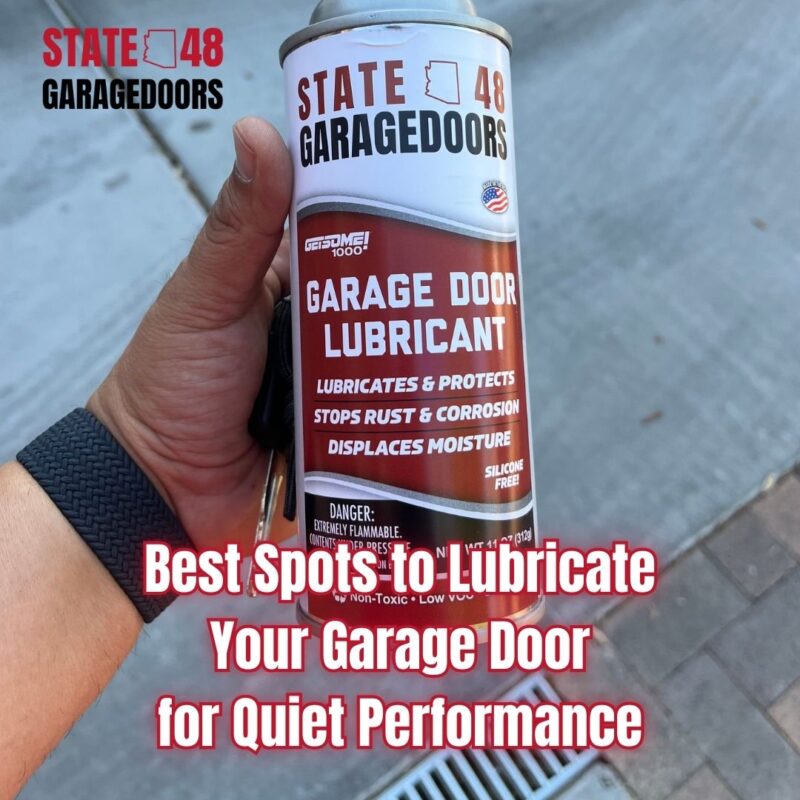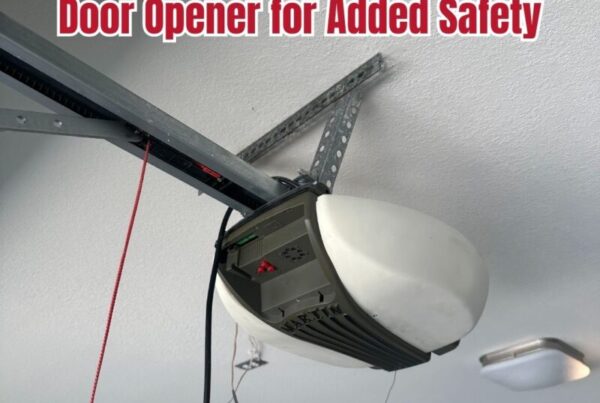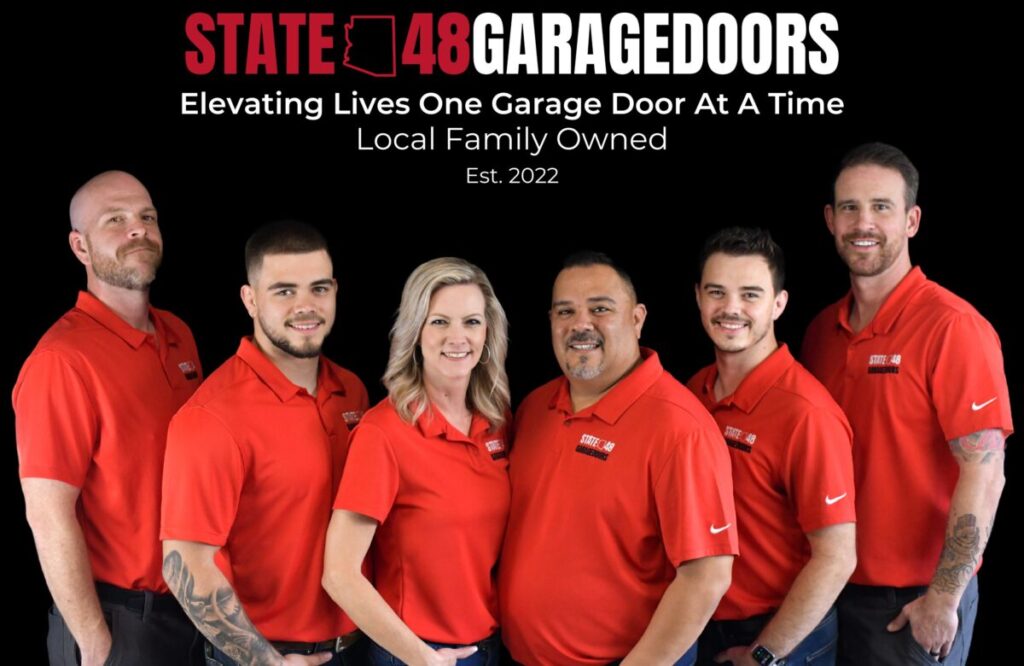
Best Spots to Lubricate Your Garage Door for Quiet Performance

Effective Lubrication Techniques for a Silent GarageDoor
Is your garagedoor disturbing your peace with its noisy operation? A properly lubricated garagedoor can operate silently and smoothly. This guide will show you how to choose the right lubricants and apply them correctly to your garagedoor. You’ll learn about common lubrication mistakes to avoid and get tips for maintaining a quiet garagedoor. By following these steps, you can enjoy a quieter home and extend the life of your garagedoor mechanism.
Understand the Importance of Lubrication for Garage Doors

You’ll learn how proper lubrication improves your garage door’s performance and prevents common issues. Discover the benefits of regular maintenance, including smoother operation and reduced noise. We’ll guide you through troubleshooting techniques and help you choose the best lubricant for your roller doors, belt, and steel components. Our customer service team at garagedoorrepairphoenix is here to assist you with any questions.
Learn How Lubrication Improves GarageDoor Performance
You’ll notice a significant improvement in your garagedoor‘s performance with proper lubrication. By applying the right lubricant to your garagedoor opener and overhead doors in Phoenix, you’ll reduce friction and wear on moving parts. This simple home improvement task helps your door operate more smoothly and quietly, extending its lifespan and preventing costly repairs. Remember to use the appropriate tools and lubricants for best results.
Identify Common GarageDoor Issues Due to Lack of Lubrication
You might notice your garagedoor making strange noises or moving sluggishly if you haven’t lubricated it recently. These issues often signal the need for a garage spring lubricant or general garage lubricant. Without proper maintenance, you could face higher prices for a replacement garage door down the line. To avoid this, schedule a professional inspection to assess your door‘s condition and lubrication needs.
Discover Benefits of Maintaining a Lubricated GarageDoor
You’ll enjoy several benefits when you maintain a well-lubricated garagedoor. A skilled technician can apply lithium-based lubricants to your overhead door, reducing friction and preventing water damage. This simple maintenance step can save you money on your credit card by extending the life of your door and reducing the need for costly repairs. Plus, a smooth-running door enhances your home’s curb appeal and security.
Choose the Right Lubricants for Your GarageDoor

You’ll find the right lubricant for your Phoenixgaragedoor to reduce noise and ensure smooth operation. Explore different types of lubricants, from oil to eco-friendly options, and learn which suits your specific door type. Take pride in maintaining your garagedoor properly, potentially lowering insurance costs and preventing costly repairs.
Explore Different Types of Lubricants for Garage Doors
You’ll find various lubricants designed for garage doors, each serving a specific purpose. Silicone-based sprays work well for plastic components and can help reduce tension on moving parts. For metal-on-metal contact points, like those around the socket wrench area, lithiumgrease offers excellent protection. When lubricating near sensors, opt for a dry lubricant to avoid interfering with their function.
Assess Which Lubricant Suits Your Specific GarageDoor Type
You need to choose the right lubricant for your garagedoor based on its specific components. For metal bearings, use a silicone-based lubricant to reduce friction and prevent rust. If your door has plastic parts, opt for a dry lubricant to avoid attracting dust. An expert in garage door repairs can help you select the best product for your zip code‘s climate conditions. Remember, proper lubrication is key to preventing costly repairs and ensuring smooth operation:
- Metal bearings: Silicone-based lubricant
- Plastic components: Dry lubricant
- High-humidity areas: Moisture-resistant lubricant
- Cold climates: Low-temperaturegrease
Find Eco-Friendly Lubrication Options Available in the Market
You can find eco-friendly lubrication options for your garagedoor that are both effective and environmentally conscious. These products use natural ingredients that won’t harm the environment during installation or maintenance. Many silicone-based lubricants are now formulated to withstand high heat and protect your car from drips. Choose options that reduce friction without leaving residue, ensuring smooth operation while being kind to the planet:
- Plant-based lubricants
- Biodegradable silicone sprays
- Water-based lubricants
- Non-toxic, food-grade options
- Recycled packaging products
Step-by-Step Guide to Lubricate Your GarageDoor

You’ll find it easy to keep your garagedoor silent with proper lubrication. This guide walks you through preparing your door, applying lubricant to tracks and rollers, and addressing other components like the torsion spring and gear. By reducing friction, you’ll enjoy smoother operation and fewer complaints on Yelp. Remember, the right garagegrease makes all the difference.
Prepare Your GarageDoor for Effective Lubrication
Before you start lubricating, you’ll need to prep your garagedoor. Use a screwdriver to tighten any loose screws and check the door‘s weight to ensure it’s balanced. Clear away any debris from the tracks and rollers. If you notice any serious issues, don’t hesitate to call for emergency service—our truck can be at your home quickly to address any problems before you begin the lubrication process.
Apply Lubricant to Tracks and Rollers Properly
You’ll want to apply lubricant to your garagedoor‘s tracks and rollers carefully. Start by cleaning the tracks with a damp cloth, then use a spray lubricant on the inner sides of the tracks where the rollers move. For the chain drive and pulley system, apply a light coating of grease to reduce friction. Remember to lubricate the torsion springs as well, but be cautious – if you’re unsure, consult a professional. Many homeowners on Reddit recommend using a silicone-based lubricant for best results.
Address Other Components That Require Lubrication
You’ll want to pay attention to other crucial components of your garagedoor that need lubrication. Apply a thin layer of motor oil to the hinges, bearings, and metal springs to keep them moving smoothly. In Arizona‘s dry climate, regular lubrication prevents rust and reduces wear on these parts. If you notice any issues during this process, consider contacting a professional for garagedoor replacement. Remember, proper maintenance can extend the life of your door and save you money in the long run.
Common Mistakes to Avoid When Lubricating Garage Doors

You’ll want to avoid common lubrication mistakes to keep your garagedoor running smoothly. Learn how to prevent over-lubricating, which can attract dirt and void your warranty. Discover which parts shouldn’t be lubricated, like the genie screw drive. Understand when it’s time to call a pro for help with tricky bolts or complex door lube issues.
Recognize the Pitfalls of Over-Lubricating Garage Doors
You might think more lube means better performance, but over-lubricating can cause serious issues. Excess grease attracts dust and debris, leading to increased wear and potential rust. In emergency situations, this buildup can even cause your door to stick. Use aerosol lubricants sparingly, and wipe away any excess. If you’re unsure about proper application, don’t hesitate to email our address for expert advice. Remember, a little goes a long way when it comes to garagedoor lubrication:
- Use lubricant sparingly
- Clean off excess immediately
- Avoid attracting dust and debris
- Prevent potential sticking and wear
- Seek professional help if uncertain
Understand What Not to Lubricate on Your GarageDoor
You should avoid lubricating certain parts of your garagedoor to prevent damage. Don’t apply grease or oil to the tracks, as this can attract dirt and cause the rollers to slip. For genie screw drive systems, avoid using regular lubricants; instead, use a specific genie screw drive grease or lubricant recommended by the manufacturer. When tightening bolts, use a wrench carefully without applying lubricant to the threads. If you’re unsure about any part, it’s best to consult a professional rather than risk damaging your door‘s javascript-controlled components. Here’s a quick list of areas to avoid lubricating:
- Garagedoor tracks
- Genie screw drive (unless using specialized lubricant)
- Bolt threads
- Electronic components
- Weather stripping
Learn When to Seek Professional Help for Lubrication
You should seek professional help for lubrication when dealing with complex components like weatherstripping or wood doors in the Phoenix metropolitan area. If you’re unsure about the right door lubricant to use, especially for silicon-based parts, it’s best to call an expert. They can properly assess your garagedoor‘s needs and apply the correct products to ensure smooth operation without damaging sensitive materials.
Maintain Your GarageDoor for Long-Lasting Silence

You’ll keep your garagedoor silent by setting a regular maintenance schedule, inspecting hardware, and cleaning tracks. This investment prevents wear on hinges and nylon components, reducing vibration. Check your door‘s condition often and share tips with neighbors on Facebook. Regular upkeep ensures smooth, quiet operation for years to come.
Set a Regular Maintenance Schedule for GarageDoor Lubrication
You’ll want to mark your calendar for regular garagedoor greasing to keep it silent. Set reminders every 3-6 months to lubricate key components, preventing dust buildup and reducing noise. By sticking to this schedule, you’ll maintain effective soundproofing and ensure smooth operation. Remember, consistent maintenance is the key to a quiet garagedoor.
Inspect GarageDoor Hardware for Wear and Tear Regularly
You should regularly check your garagedoor‘s hardware for signs of wear and tear to prevent costly repairs. Inspect the ball bearings in your rollers, as these can corrode over time, especially in the humid climate of Phoenix. If you notice any unusual sounds or resistance when opening your door, it might be time to lubricate your garage roller door or call for garagedoor repair in Phoenix. Remember, proactive maintenance in the United States can save you money and keep your door operating smoothly.
Keep GarageDoor Tracks Clean and Free of Debris
You’ll want to keep your garagedoor tracks clean to prevent wear and tear on your garage doors. Use a damp cloth to wipe down the tracks, removing any debris that could cause friction. While you’re at it, check the garagedoor spring and other components like nuts and glass for any signs of damage. Regular cleaning not only helps your door operate smoothly but also extends the life of your garage doors garage system.
Troubleshooting Noisy Garage Doors After Lubrication

You might notice your garagedoor still making noise after lubrication. Don’t worry – we’ll help you identify the causes, check for misalignment, and know when to call a pro. Temperature changes can affect your doors’ performance, so we’ll consider that too. Whether it’s a manufacturing issue or something on your roof, we’ll guide you through troubleshooting steps to keep your customers happy and your garagedoor silent.
Identify Causes of Noise Despite Lubrication Efforts
You might still hear noise from your garagedoor even after lubrication. To identify the cause, grab a ladder and listen closely as the door operates. Pay attention to different sounds like grinding, squeaking, or rattling. These noises can point to issues beyond lubrication, such as worn-out rollers or misaligned tracks. By pinpointing the exact source of the sound, you’ll be better equipped to address the problem and achieve a quieter garagedoor operation.
Check for Misalignment and Other Potential Issues
You should inspect your garagedoor for misalignment issues if lubrication doesn’t solve the noise problem. Check if the tracks are parallel and the rollers are seated properly. Look for bent or damaged sections that could cause friction. If you spot any issues, adjust the tracks or replace damaged parts. Remember, a well-aligned door operates more smoothly and quietly, even with proper lubrication.
Know When to Call a Technician for Persistent Problems
You should call a technician if your garagedoor remains noisy after lubrication and basic troubleshooting. If you’ve tried adjusting tracks, tightening hardware, and applying lubricant but still hear unusual sounds, it’s time for professional help. A certified garagedoorexpert can diagnose complex issues like worn-out bearings or damaged springs that you might miss. Don’t risk your safety or cause further damage by attempting repairs beyond your expertise.
Conclusion
Proper lubrication is crucial for maintaining a silent, smooth-operating garagedoor, preventing costly repairs and extending its lifespan. By choosing the right lubricants, applying them correctly to tracks, rollers, and other components, and avoiding common mistakes like over-lubricating, you can significantly improve your door‘s performance. Regular maintenance, including cleaning tracks and inspecting hardware, ensures long-lasting silence and efficient operation. When persistent noise issues arise despite your efforts, don’t hesitate to call a professional technician to address complex problems and keep your garagedoor running quietly and reliably.




